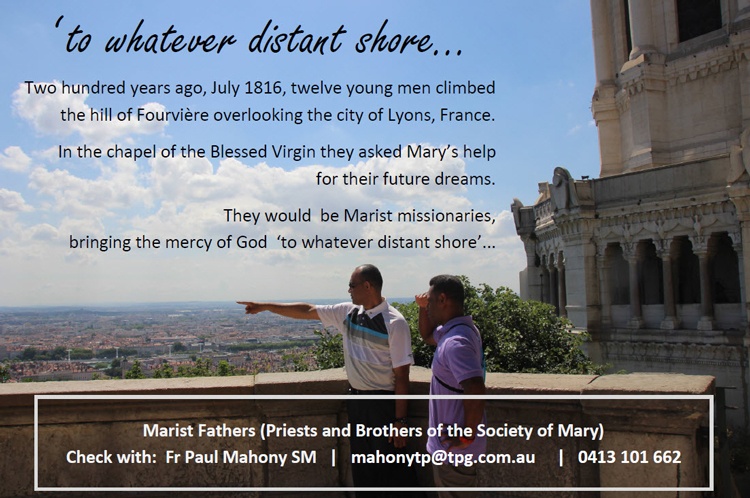Fr Colin was reflecting one day on just how he would approach the formation of young men who were being formed in the Marist way. He said he would speak with them individually twice a week. Interestingly enough, he said:
…. for the first two or three months I would not take the initiative in making any observations to them. The Rule says that in the beginning they must be treated consideratius et attentius (‘with great care and attention’). I would just let them speak, replying to what they said, and indicating the way they might correct the faults they have noticed in themselves and pointed out to me. (A Founder Speaks, 63:2)
I believe this demonstrates three important things about Fr Colin’s presence. Firstly, he placed great value on listening carefully to people. He saw his encounter with them as a conversation rather than a series of demands and injunctions. Secondly, he clearly recognized the primacy of grace. In the mutuality promoted by this listening presence, he was allowing time for awareness of God to grow. Whatever good comes of our presence will be the working of grace. The presence will typically be a gracious presence.
Thirdly, this all worked towards enabling them to taste God, trusting that all else would follow that and nothing would be achieved until or unless that taste was experienced:
I would try simply to unite them to God, to bring them to a spirit of prayer. Once they were united to God, everything else would take care of itself; no matter how you plant the seed and tire yourself out, the life-giving principle is still lacking. But having once tasted God, a novice will turn to him again and again. It is a treasure in his soul, something to which he is constantly brought back as to his own centre. There he will love to converse with God. (Ibid.)
On another occasion Fr Colin said, speaking of the formation of the seminarians:
People make a great mistake. Man can do nothing in this domain (of learning to pray), it is a matter for God. If once they are united to God, they will gain more in a day than anything you might do. Yes, if once they have tasted God, you will have only one problem left: how to hold them back. You will say, ‘But they will sleep’. Well, then. Let them sleep, and give a charitable admonition later in direction to anyone who has allowed himself to doze. (A Founder Speaks, 64:1.)
And again:
You have also to learn to taste God; oh, yes, to taste God …. To taste God is to feel your heart wounded. (A Founder Speaks, 65:3)
Fr Colin was in tune with the best of the tradition in this regard, recognizing that the encounter with God goes hand-in-hand with an encounter with self. Speaking to the novices one day he said:
You must work hard at achieving the aim of the novitiate, which is first of all to get to know yourself, and then to unite yourself to God, to become men of prayer, men of faith …. (A Founder Speaks, 140:5.)
Unfortunately, Fr Colin lived at a time when mysticism was viewed with great suspicion. A common jibe was: Mysticism begins in mist and ends in schism. (This was wrongly attributed to John Henry Newman. I believe it is more likely to have been said by Ronald Knox.) Mysticism is the lived and living awareness of the unity of all things. God is the source of that unity. Specifically Christian mysticism is the lived and living awareness that all people, events and thing find their purpose in Jesus Christ. He is the Incarnation of God, the sources of all goodness, all truth, all beauty and all unity.
There is a rich vein of mysticism in the Christian tradition. The renewal and reform of Christianity depends in large measure on our willingness and ability to recover the mystical heart of our faith. Marist presence is inherently mystical and therefore has a crucial part to play in that renewal and reform.
